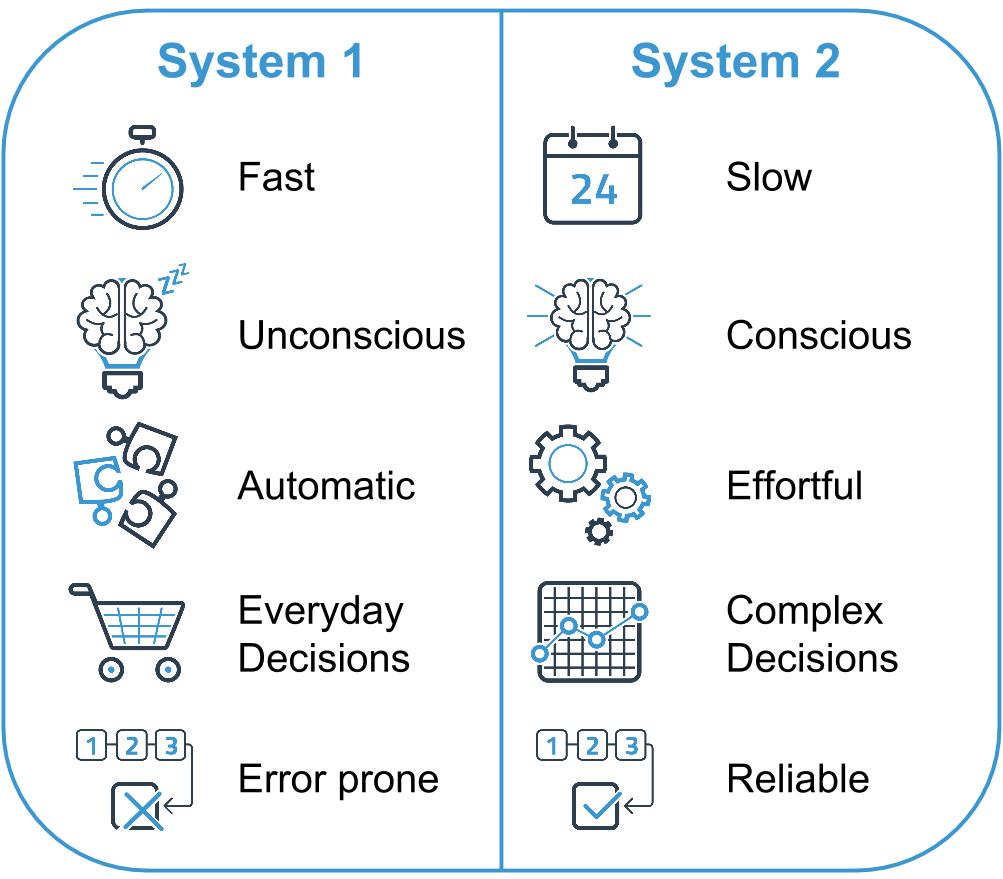Daily we are required to make decisions, recall facts, and balance risks, whether at work or at home.
All of this requires considerable thinking yet we don’t really pay much attention to how we do that. Is it because its so easy or because it is so hard????
Let’s explore….
If we were to ask a friend or colleague “What is capital of France?” most will quickly come up with the right answer. Paris, of course. Easy question and not a lot of effort goes into finding the answer. The same goes if I were to ask you to spot the pattern in this series of numbers 122333….?? Yes, you got it. 4444.
But what if you were asked to come up with the answer to 15 x 24 without using your phone/calculator? If you are like most people, this question requires you to pause and think hard. If you were good at math in school you might be able to recall a shortcut or you just might have to get out pen/paper and figure it out the old-fashioned way. Unless you are a math superstar, it will be difficult to come up with the answer quickly but, given time, we can all do it. The answer btw is 360.
If you consider yourself in the top 1% in terms of math abilities and are still feeling comfortable, here is my favourite math challenge of all time:
· A bat and ball cost $1.10 to purchase
· The bat costs one dollar more than the ball,
· How much does the ball cost?
Allow me to keep you in suspense as you mull that one over. The answer is at the bottom of the page.
What these mind exercises illustrate is something that Daniel Kahneman refers to as “Thinking, Fast and Slow”, which happens to be the name of his best-selling book from 2011. Kahneman, who is now in his mid-80’s, is acknowledged to be the father of the field of behavioural economics. As a trained psychologist, and proudly not an economist, he has always been considered an iconoclast in his field of study. Along with his now deceased partner, Amos Tversky, he has spent a lifetime studying and gaining insight into how the human mind behaves.
As a result of their ground-breaking studies, Kahneman and Tversky came to realize that there are actually two systems at play in our brains which affect our reasoning, judgement and decision making:
· System 1 operates automatically in the background at all times. It is quick and intuitive requiring little or no effort to come up with an answer. System 1 allows us to answer “Paris” to the question about the capital of France. When we use this system to think we are looking for patterns and meaning from the information at hand. Consequently, it is prone to mistakes. We can easily make judgment errors and fall victim to bias and are generally unaware of these errors when they happen.
· System 2 kicks in when System 1 can’t provide the answer, like in the example of 15 x 24. This type of thinking is necessarily slow and deliberative. It requires great effort and we have to pay careful attention. It works best when it tests and checks results from System 1. It too can be prone to errors if we become distracted and lose our focus on the task at hand.

As someone who has spent their career helping colleagues make important procurement decisions there is much we can learn from Kahneman and the study of the human mind. How often have we seen rushed evaluations and distracted evaluators lead to the wrong contractor being selected and poor project outcomes?
That is not to say that evaluations need to be dragged out unnecessarily. The use of enabling technology and more effective evaluation methods can make a huge impact and result in better overall outcomes, while still being completed in a timely manner. I advocate for drafting more effective and efficient evaluation schemes. On your next RFP, consider asking suppliers to respond in a structured manner to avoid having evaluators engage in an endless cycle of page flipping as they seek to find the pertinent information. Try using enhanced consensus scoring where you focus only on the differences in scoring that exceed a pre-determined variance. We often spend too much time debating the merits of a 6 vs 7 and too little time trying to reconcile significant differences of opinion. Finally, spend the time to adequately prepare and train evaluators, even those who have previous experience. Awareness of how the mind operates and the pitfalls to avoid can go a long way towards a better outcome.
In closing, here are my top advice tips to evaluators:
· Be prepared to invest the time necessary to the task
· Don’t rely on your fellow evaluators to bail you out
· Slow down your thinking and avoid the rush to judgment
· Pay attention to the details
· Use critical thinking
· Be respectful of other viewpoints during consensus meetings
· Be aware of your biases – everyone has them
· When relying solely on intuition, pause and use slow thinking to check/recheck the result
The ball costs $0.05
https://www.wayfinderconsultinginc.com/




 If 10,000 hours (or 5 years of 8 hours of practice 5 days a week) scares the pants off you, it has been established that 10,000 hours is insufficient in the most highly competitive fields such as the Olympics. Performances that were record-setting twenty years ago are now achieved in training by many competitive athletes! Or, maybe looking at this from a more reassuring angle, in pursuits where the bar is set low (like leadership?), significantly fewer than 10,000 hours are required to become outstanding. After all, the U.S. had 1 Olympic athlete in Rio for every 583,213 Americans – as compared to 1 people manager for every 4.7 employees.
If 10,000 hours (or 5 years of 8 hours of practice 5 days a week) scares the pants off you, it has been established that 10,000 hours is insufficient in the most highly competitive fields such as the Olympics. Performances that were record-setting twenty years ago are now achieved in training by many competitive athletes! Or, maybe looking at this from a more reassuring angle, in pursuits where the bar is set low (like leadership?), significantly fewer than 10,000 hours are required to become outstanding. After all, the U.S. had 1 Olympic athlete in Rio for every 583,213 Americans – as compared to 1 people manager for every 4.7 employees.







